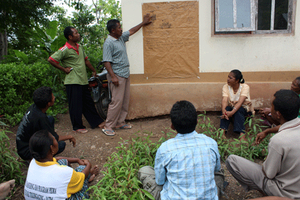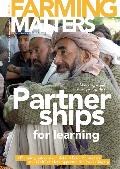What do we want to learn from each other? The Belgian organisation Vredeseilanden (referred to as VECO in its partner countries) has developed a new planning, learning and accountability system with its partners in Indonesia, with the aim of learning more from their field experiences and integrating these lessons into the steering of the organisation. This has worked – although they have also found out that becoming a learning organisation requires endurance and determination.
Steff Deprez was working with VECO Indonesia when he was asked in 2007 to work out a new planning system with his team. What followed was an intensive year of researching and experimenting, for which he relied on Outcome Mapping, a planning and evaluation approach developed by the International Development Research Centre in Canada as an alternative to the often used Logical Framework.
Outcome Mapping starts by examining what actors within a certain sector or value chain do, and what do they wish to change. “Outcome mapping is another way of looking, based on a different theory of change,” says Deprez, “but that is not enough to make it work.
You can only achieve intended changes with a good learning and monitoring system. So we also developed a new planning, learning and accountability (PLA) system for developing sustainable agriculture chains.”
Information with a purpose
A key feature of the PLA system is that it creates an organisational space so that farmers, other partners in a value chain and VECO get together on a regular basis and discuss what has been done, share experiences, evaluate the effectiveness of their activities and take decisions for the future.
These chain meetings are well structured in terms of gathering information and sense making. “Instead of collecting a lot of data to satisfy donors, we wanted information for steering the joint programme”, explains Deprez, “and a shared report containing the output of these bi-annual chain meetings gives us more valuable information than all those 50-page partner reports”.
Not every organisation is used, or equipped, to deal with this kind of planning and reporting, so, under the new system, VECO partners are free to use their own reporting formats internally. VECO takes responsibility for translating the PLA system reports into the language or format preferred by donors.
Clarity
After a few chain meetings, partners became acquainted with the process. Adopting PLA has improved the relationship between VECO Indonesia and its partners, as it demands more clarity about the roles of all those involved. As one of the NGO partners said in relation to their experience with Outcome Mapping and the PLA system, “The new programme framework made it easier for us to see the focus of the programme. Our roles as local NGOs were spelt out, and our goals became more specific and focused.”
How to PLAn outcomes
The Planning, Learning and Accountability (PLA) system is a learning-oriented monitoring and evaluation system that provides a framework for systematic data collection, interpretation and documentation. It consists of well-defined procedures, reporting formats and keeping a detailed annual calendar.
The actions of all the partners within the value chain are central to the learning and monitoring process. In the agricultural value chain programme these partners are local service-providing NGOs, farmer or producer organisations and private chain actors. These partners all agree on the desired changes in behaviour, relationships and activities that will contribute to the objective of the programme, and they jointly set indicators for achieving these. During the bi-annual chain meetings each partner tells the others about what they have been doing, the intentions and the results achieved. The partners jointly evaluate the activities, share information, discuss roles and agree on joint interventions. The minutes of these meetings form the basis of a shared report from VECO and its partners. The meetings last for two or three days.
The theory behind Outcome Mapping rests on the idea that monitoring and evaluation should be focused on the level of partners’ activities (their sphere of influence). But VECO also wants to monitor changes in the value chain (the sphere of interest) in order to understand the impact of the programme, the effectiveness of the support it provides to partners and its internal organisational practices (the sphere of control).
It made all partners more aware of their own roles and responsibilities, and also gave them a new perspective on what they were doing. According to a VECO Indonesia staff member, “Under the old way of doing things, if they (our partners) did not achieve the planned outputs, it would mean they had failed. Now they can still show progress, and this has encouraged them to speak more openly with us about their weaknesses.”
Flexibility
According to Steff Deprez, the best thing about PLA is that it permits real learning: “We now gather information for what it is meant for: to make sense of it, to learn and to adapt plans. It gives us all more flexibility.”
Deprez admits that it is merely a question of “sitting down and asking the right questions. You can do that in every organisation or style of management. But often monitoring is lacking or inadequate, and then projects fall back on the basics of the original framework. That makes reporting more like filling in boxes, while reality is more complex.”
The process of learning and monitoring that VECO has developed and implemented is still fragile: it requires continuous investment and being alert to make it work. Participative tools and knowledge about facilitation need to be regularly reviewed; people’s capacities need to be strengthened, the organisation and management needs to stay fully committed. But, as with all partnerships for learning, it is challenging and worthwhile. This is clear to all those involved.
Text: Mireille Vermeulen
Photos: We now gather information to make sense of it, to learn and to adapt plans.” By: Steff Deprez
More Information
Steff Deprez currently works as Coordinator for Planning, Learning & Accountability at the Vredeseilanden head office in Leuven, Belgium. E-mail: steff.deprez@vredeseilanden.be



